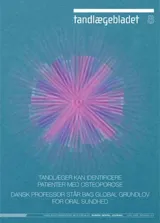Brodam W. Cochrane-review: Profylaktisk antibiotika ved implantatbehandling anbefales
Kontaminering i forbindelse med implantatindsættelse erproblematisk, fordi infektioner omkring implantater ervanskelige at behandle – og fordi infektionerne kan kompromittereimplantaternes overlevelse. Et nyt Cochrane-review harundersøgt effekten af forskellige antibiotikaregimer i forbindelse med implantatindsættelse.
Reviewet inkluderer to studier. Det ene sammenligner behandlingmed 2 g Amoxicillin præoperativt versus placebo hos 316patienter. Det andet sammenligner ingen antibiotikabehandlingmed behandling bestående af 2 g Amoxicillin præoperativt og 500mg 4 x dagligt 2 dage – hos i alt 80 patienter.
Metaanalyse af de to studier viste, at et signifikant større antalpatienter i grupperne uden antibiotika fik implantatproblemer.
Cochranes forfattere konkluderer, at der er nogen evidens for,at 2 g Amoxicillin givet peroralt 1 time før operation signifikantreducerer risikoen for infektioner. Reviewet konkluderer ikkenoget omkring postoperativ antibiotikabehandling eller valg afantibiotikapræparat.
Ifølge reviewet kan man anbefale behandling med en dosisprofylaktisk antibiotika lige før implantatindsættelse.
Kommentar af overtandlæge Simon Storgård Jensen,Kæbekirurgisk Afdeling, Glostrup Hospital:
– Valg af evt. antibiotikaprofylakse bør altid baseres på følgendeovervejelser: 1) hyppigheden af infektiøse komplikationer relaterettil det planlagte indgreb, 2) konsekvensen af en infektiøskomplikation og 3) evidensen for effekt af antibiotikaprofylakse(1).
Hyppigheden af tidlige infektioner efter implantatindsættelsei mundhulen er forholdsvis lav (
Når et Cochrane-review således bekræfter, hvad tidligereundersøgelser har tydet på (2,3), må det anbefales, at der givesantibiotikaprofylakse i forbindelse med implantatindsættelse. Deter endnu ikke undersøgt, om Amoxicillin (anvendt i de to randomiseredeundersøgelser, som ligger til grund for denne oversigt)er det mest hensigtsmæssige førstevalgspræparat. Uafhængigtaf præparatvalg skal en profylaktisk antibiotikabehandlingimidlertid startes en time præoperativt, når den administreresperoralt, for at opnå den bedste effekt. Der findes ingen sikre datafor, hvorvidt en enkelt dosis præoperativt rækker, eller om denbør følges op det første postoperative døgn, men der er ingengrund til at fortsætte behandlingen i en uge, som det tidligerehar været brugt.
Litteratur
1. Peterson LJ. Antibiotic prophylaxisagainst wound infections in oral andmaxillofacial surgery. J Oral MaxillofacSurg 1990; 48: 517-20.
2. Dent CD, Olson JW, Farish SE,Bellome J, Casino AJ, Morris HFet al. The influence of preoperativeantibiotics on success of endossousimplants up to and including stage IIsurgery: a study of 2,641 implants.J Oral Maxillofac Surg 1997; 55(suppl 5): 19-24.
3. Laskin DM, Dent CD, Morris HF,Ochi S, Olson JW. The influenceof preoperative antibiotics on successof endossous implants at 36months. Ann Periodontol 2000; 5:166-74.
Abstract
Background: Some dental implant failures may be due to bacterial contamination at implant insertion. Infection s around biomaterials aredifficult to treat and almost all infected implants have to be removed. In general, antibiotic prophylaxis in surgery is only indicatedfor patients at risk of infectious endocarditis, for patients with reduced host-response, when surgery is performed ininfected sites, in cases of extensive and prolonged surgical interventions and when large foreign materials are implanted. Tominimize infections after dental implant placement various prophylactic systemic antibiotic regimens have been suggested. More recent protocols recommended short term prophylaxis, if antibiotics have to be used. With the administration of antibioticsadverse events may occur, ranging from diarrhoea to life-threatening allergic reactions. Another major concern associatedwith the widespread use of antibiotics is the selection of antibiotic-resistant bacteria. The use of prophylactic antibiotics inimplant dentistry is controversial.
Objectives: To assess the beneficial or harmful effects of systemic prophylactic antibiotics at dental implant placement versus no antibiotic/placebo administration and, if antibiotics are of benefit, to find which type, dosage and duration is the most effective.
Search strategy: The Cochrane Oral Health Group’s Trials Register, the Cochrane Central Register of Controlled Trials (CENTRAL), MEDLINEand EMBASE were searched up to 9th January 2008. Several dental journals were handsearched. There were no languagerestrictions.
Selection criteria: Randomised controlled clinical trials (RCTs) with a follow up of at least 3 months comparing the administration of various prophylacticantibiotic regimens versus no antibiotics to patients undergoing dental implant placement. Outcome measures wereprosthesis failures, implant failures, postoperative infections and adverse events (gastrointestinal, hypersensitivity, etc).
Data collection and analysis: Screening of eligible studies, assessment of the methodological quality of the trials and data extraction were conducted induplicate and independently by two review authors. Results were expressed as random-effects models using risk ratios (RRs)for dichotomous outcomes with 95 % confidence intervals (CIs). Heterogeneity was to be investigated including both clinicaland methodological factors.
Main results: Two RCTs were identified: one comparing 2 g of preoperative amoxicillin versus placebo (316 patients) and the other comparing2 g of preoperative amoxicillin plus 500 mg 4 times a day for 2 days versus no an tibiotics (80 patients). The meta-analysesof the two trials showed a statistically significant higher number of patients experiencing implant failures in the group notreceiving antibiotics: RR = 0.22 (95 % CI 0.06 to 0.86). The number needed to treat (NNT) to prevent one patient having animplant failure is 25 (95 % CI 13 to 100), based on a patient implant failure rate of 6 % in patients not receiving antibiotics.The other outcomes were not statistically significant, and only two minor adverse events were recorded, one of which in theplacebo group.
Authors’ conclusions: There is some evidence suggesting that 2 g of amoxicillin given orally 1 hou r preoperatively significantly reduce failures ofdental implants placed in ordinary conditions. It remains unclear whether postoperative antibiotics are beneficial, and whichis the most effective antibiotic. It might be recommendable to suggest the use of one dose of prophylactic antibiotics priorto dental implant placement.
Esposito M, Grusovin MG, Talati M, Coulthard P, Oliver R, Worthington HV. Interventions for replacing missing teeth: antibiotics at dental implant placement to preventcomplications. Cochrane Database of Systematic Reviews 2008, Issue 3. Art. No.: CD004152. DOI: 10.1002/14651858.CD004152.pub2.


